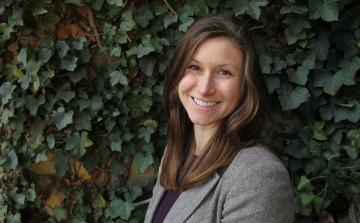 On July 1, 2016, the Department of Psychology welcomed Dr. Joelle LeMoult as Assistant Professor in the clinical area. Dr. LeMoult comes to UBC from Stanford University, where she was a Postdoctoral Research Fellow in Psychology. She received her PhD in Clinical Psychology from the University of Miami in 2012.
On July 1, 2016, the Department of Psychology welcomed Dr. Joelle LeMoult as Assistant Professor in the clinical area. Dr. LeMoult comes to UBC from Stanford University, where she was a Postdoctoral Research Fellow in Psychology. She received her PhD in Clinical Psychology from the University of Miami in 2012.
In addition to planting new roots with her young family in Vancouver, she will continue to explore the behavioural responses to stress that hinder cognitive, emotional, and biological wellbeing.
Through her research she works to further our understanding of the etiology, maintenance, and treatment of depression. Using an integrated approach, she examines the cognitive, emotional, and biological responses to stress that contribute to depressive symptoms.
In this Q&A, she shares her research, what sparked her interest in studying depression, and what she does when she’s not in the lab or classroom.
First of all, can you tell us a little about yourself?
I was born and raised in the US. I completed my MA in San Francisco and my PhD in Miami before moving up to Toronto for my clinical internship. I then returned to the San Francisco area to complete a postdoctoral fellowship at Stanford University. Living and working in cities throughout the US and Canada has been a wonderful opportunity to travel and to learn about different cultures, but I am now looking forward to putting down roots in Vancouver.
What kinds of questions do you try to answer through your research?
I am interested in understanding how depression develops and unfolds across the lifespan. Given the strong link between stress and depression, I focus in particular on understanding how and why people respond to stress in ways that increase depressive symptoms. I take a wholistic approach to answering these questions: integrating cognitive, biological, and emotional measures to better elucidate the link between stress and depression.
Can you give us an example of this in our daily lives?
We all experience stress in our daily lives. Take, for example, a student who performs poorly on a test, a professional who experiences a set-back at work, or someone who has a fight with a friend or family member. Some people have more intense and prolonged reactions to these stressors – they feel more negative emotions, experience greater biological responses, and exhibit more negative thinking patterns – and as a result, like quicksand, this momentary setback spirals into a depressive episode.
How did you become interested in this line of research?
Before beginning my PhD I worked as a research assistant in the Mood and Anxiety Disorders Laboratory at Stanford University, and I interviewed many people who were depressed. Most of them talked about the fact that a negative life event had precipitated, and even triggered, their depressive episode. What was interesting to me is that the negative life events that they described (breakups, failures, losses) were ones that most people have experienced. This prompted me to question why some people responded to stress differently than others. What makes some people more vulnerable? And when does stress lead to depression?
Can you tell us about any new research that you are particularly excited about?
I am particularly excited about better understanding behavioural responses to stress. Treatment for depression focuses on behavioural change, and we know that changing behaviours leads to improved cognition and biological functioning. We don’t completely understand, however, whether the relationship is bidirectional. For example, are there behavioural responses to stress that hinder cognitive, emotional, and biological wellbeing?
Do you have a motto?
I don’t have an explicit motto, but for me, research is about balancing curiosity and compassion.
What do you like to do in your free time?
I love to spend time outdoors with my family, to host dinner parties (my husband is a chef), and to watch my 9-month old son discover something for the first time.